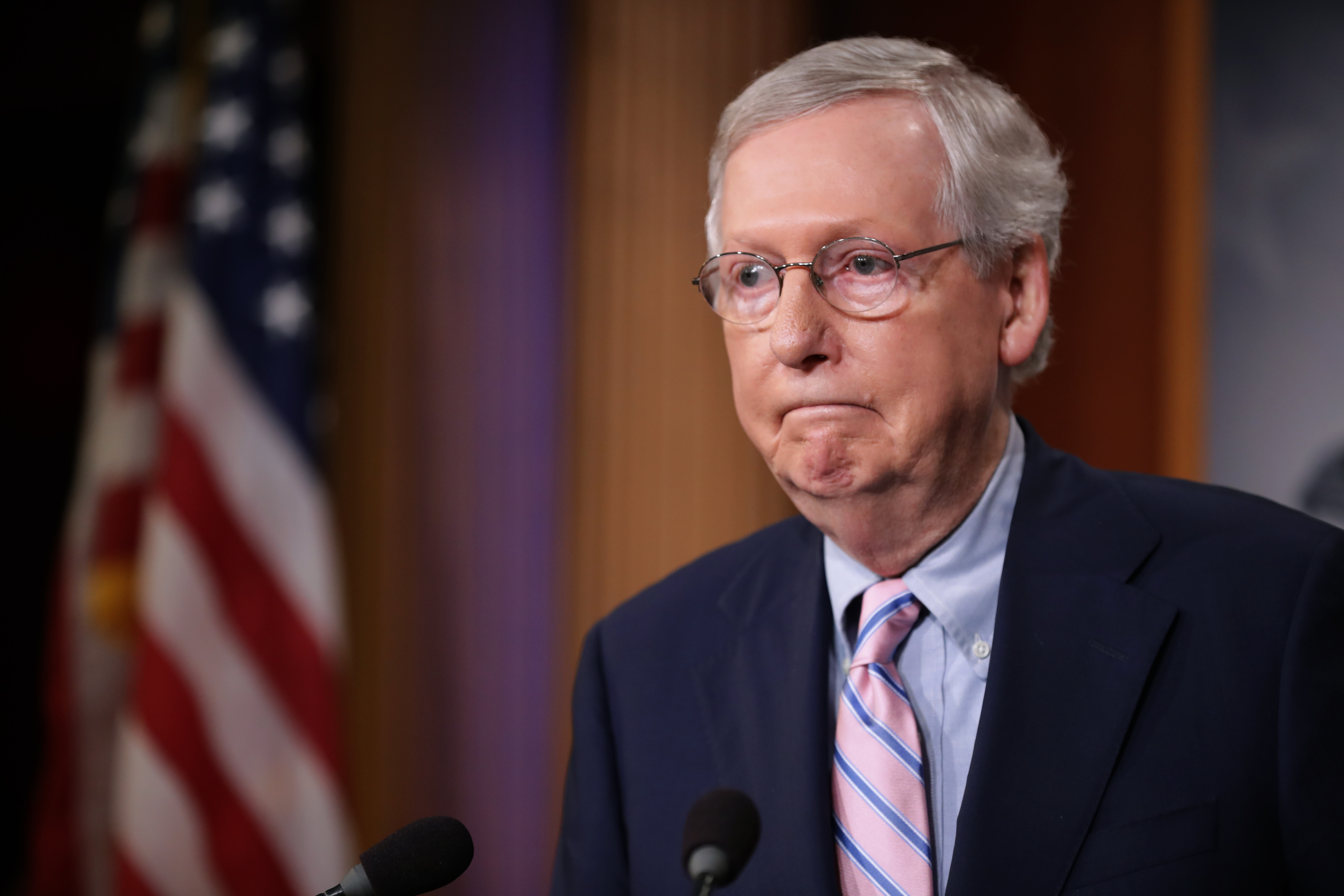Mitch McConnell blames the soaring deficit on Medicare and Social Security, not the GOP tax cuts


A free daily email with the biggest news stories of the day – and the best features from TheWeek.com
You are now subscribed
Your newsletter sign-up was successful
Senate Majority Leader Mitch McConnell's (R-Ky.) "single biggest regret of my time in Congress," he told Bloomberg News on Tuesday, is "our failure to address the entitlement issue." McConnell said that the mushrooming federal deficit, which the Treasury Department just said grew to $779 billion last fiscal year — 77 percent higher than when McConnell became majority leader in 2015 — is "very disturbing," but he blamed Medicare and Social Security spending, not the $1.5 trillion tax cut he steered through last year.
"I think it's pretty safe to say that entitlement changes, which is the real driver of the debt by any objective standard, may well be difficult if not impossible to achieve when you have unified government," McConnell said. Because cutting Social Security and Medicare are politically toxic, he added, it will be "very difficult to do entitlement reform, and we're talking about Medicare, Social Security, and Medicaid," while Republicans run everything. While top GOP lawmakers have recently proposed cutting Social Security, Medicare, and Medicaid to shrink the deficit, Democrats reiterated Tuesday that they won't be on board if they win one or both houses of Congress.
When advocating for the tax cuts last December, McConnell predicted they would at least pay for themselves due to stronger growth. The White House blamed the ballooning deficits on stagnant tax revenue and higher spending. "Business tax revenue fell sharply in the first nine months of this year because tax rates were cut under last year's law," The Washington Post notes. "McConnell blamed the recent run-up in the deficit on Medicare, Medicaid, and Social Security, but there haven't been policy changes in those programs to explain the major run-up in the debt in the past two years. The bigger changes have instead been bipartisan agreements to remove spending caps on things such as the military, and last year's tax cut."
The Week
Escape your echo chamber. Get the facts behind the news, plus analysis from multiple perspectives.

Sign up for The Week's Free Newsletters
From our morning news briefing to a weekly Good News Newsletter, get the best of The Week delivered directly to your inbox.
From our morning news briefing to a weekly Good News Newsletter, get the best of The Week delivered directly to your inbox.
A free daily email with the biggest news stories of the day – and the best features from TheWeek.com
Peter has worked as a news and culture writer and editor at The Week since the site's launch in 2008. He covers politics, world affairs, religion and cultural currents. His journalism career began as a copy editor at a financial newswire and has included editorial positions at The New York Times Magazine, Facts on File, and Oregon State University.
-
 How Democrats are turning DOJ lemons into partisan lemonade
How Democrats are turning DOJ lemons into partisan lemonadeTODAY’S BIG QUESTION As the Trump administration continues to try — and fail — at indicting its political enemies, Democratic lawmakers have begun seizing the moment for themselves
-
 ICE’s new targets post-Minnesota retreat
ICE’s new targets post-Minnesota retreatIn the Spotlight Several cities are reportedly on ICE’s list for immigration crackdowns
-
 ‘Those rights don’t exist to protect criminals’
‘Those rights don’t exist to protect criminals’Instant Opinion Opinion, comment and editorials of the day
-
 TikTok secures deal to remain in US
TikTok secures deal to remain in USSpeed Read ByteDance will form a US version of the popular video-sharing platform
-
 Unemployment rate ticks up amid fall job losses
Unemployment rate ticks up amid fall job lossesSpeed Read Data released by the Commerce Department indicates ‘one of the weakest American labor markets in years’
-
 US mints final penny after 232-year run
US mints final penny after 232-year runSpeed Read Production of the one-cent coin has ended
-
 Warner Bros. explores sale amid Paramount bids
Warner Bros. explores sale amid Paramount bidsSpeed Read The media giant, home to HBO and DC Studios, has received interest from multiple buying parties
-
 Gold tops $4K per ounce, signaling financial unease
Gold tops $4K per ounce, signaling financial uneaseSpeed Read Investors are worried about President Donald Trump’s trade war
-
 Electronic Arts to go private in record $55B deal
Electronic Arts to go private in record $55B dealspeed read The video game giant is behind ‘The Sims’ and ‘Madden NFL’
-
 New York court tosses Trump's $500M fraud fine
New York court tosses Trump's $500M fraud fineSpeed Read A divided appeals court threw out a hefty penalty against President Trump for fraudulently inflating his wealth
-
 Trump said to seek government stake in Intel
Trump said to seek government stake in IntelSpeed Read The president and Intel CEO Lip-Bu Tan reportedly discussed the proposal at a recent meeting
